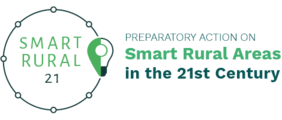How can villages survive in the 21st century? The Smart Rural 21 project has been dealing with this question since December 2019. 21 villages were accompanied in the development of a strategy for smart village development and in the start of implementation. It became clear that not all smart solutions have to include digital solutions. New cooperations, networks or other social innovations can help village communities to further develop the social and cultural infrastructure and programmes in line with the times. Nevertheless, it became clear that digital infrastructures and solutions are also of central importance for rural communities.
On 7 September, the national experts of the project met for the last time in Budapest to reflect on the results and experiences of the project. It became clear that the development of smart solutions usually depends on an active village community or group that creatively drives the project forward. In the case of digital solutions, it became apparent that it is a great advantage if those involved have a certain level of expertise or can access such knowledge (e.g. through consultation). Depending on the project, digital solutions can involve high investments in technology or infrastructure. Then it is important that there are companies or cooperatives that can offer (new) services such as eHealth, broadband, energy services etc. via these infrastructures by building or operating them.
The experiences from the project show that smart solutions can contribute to the quality of life in rural communities and strengthen the exchange within village communities. If regional companies are involved, regional value creation can also be increased. However, this requires active and creative people who can develop and implement smart solutions, for example with the help of funding. The project website shows how this was done in the 21 accompanied village communities. In addition, further project results such as profiles of smart solutions can be found there. The roadmap toolbox shows how to win over stakeholders for your own activities, how to develop goals and measures within the framework of a strategy process, and how measures should be financed and accompanied during implementation.
Contact person at IfLS: Christoph Mathias (mathias[at]ifls.de)
